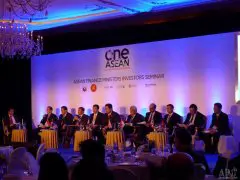Chinese Premier Li Keqiang's upcoming Southeast Asia trip due on Wednesday, aims to build a mutually-beneficial and win-win relationship with its neighbors.
The trip, in the wake of President Xi Jinping's ongoing Southeast Asia tour, reflects Chinese leaders' strategy of building a favorable environment for the development of the world's second largest economy.
During his seven-day tour in Southeast Asia, Li will pay official visits to Brunei, Thailand and Vietnam.
He is also scheduled to attend a summit with the Association of Southeast Asian Nations (ASEAN) and a series of East Asia leaders meetings in Seri Begawan, capital of Brunei.
As Qi Jianguo, former ambassador to Vietnam, said that for China's peaceful development, the visits would deepen China's strategic partnership with ASEAN and strengthen pragmatic cooperation with the three countries.
MUTUAL POLITICAL TRUST, GOOD-NEIGHBORLINESS
Over the past decade, China's relations with ASEAN member states have been raised to a new level, a hard-won achievement for both sides, while cooperation between them has yielded remarkable results and will have a bright future.
Li's three-leg tour in Southeast Asia comes at the 10th anniversary of the establishment of the China-ASEAN strategic partnership.
For years, China has unremittingly pursued and implemented a foreign policy of building a good neighborly relationship and partnership with neighboring countries, including ASEAN members.
Just as Li put it at the 10th China-ASEAN Expo in the southern Chinese city of Nanning last month, the two sides were not only able to build a "Golden Decade" over the past 10 years, but also have the ability to create another "Diamond Decade" in the future.
As neighbors, China and many ASEAN member states may be involved in complicated geo-political issues. Both sides need to bear in mind their overall interests and promote mutual trust, so as to get on a right track for cooperation of mutual benefits.
Through contacts among top leaders at both personal and working levels, Li's visits to Brunei, Thailand and Vietnam will help enhance mutual political trust between China and the three countries, so as to lay a solid foundation for their further pragmatic cooperation in various fields.
China will also adhere to its policy toward ASEAN by developing the strategic partnership with the regional bloc, resolving their differences and disputes through peaceful, friendly negotiations, and jointly safeguarding regional peace and stability.
"China has become a major force supporting ASEAN's integration and strengthening ASEAN's leading role in the region, a main focus of the bloc," said Ruan Zongze, a researcher with the China Institute of International Studies (CIIS).
As for the differences on the South China Sea issue between China and some ASEAN members, Ruan said it will not hamper the common development of the two sides.
"The South China Sea issue should not and is not able to affect the overall relationship between China and ASEAN," he said.
Li's visits will again prove that mutual political trust and mutual strategic support between China and its neighbors are conducive to their common development.
ECONOMIC MUTUAL BENEFITS, COMMON PROSPERITY
Li's visits were also expected to boost trade and economic cooperation with ASEAN member states, including Brunei, Thailand and Vietnam, which have all enjoyed dynamic trade and economic ties with China.
China was the largest trade partner of ASEAN last year, and ASEAN the third largest of China.
In 2012, two-way trade between China and Brunei, which has a population of only about 400,000, reached more than 1.6 billion U.S. dollars, with cooperation in such fields as trade, economy, energy and infrastructure gradually deepened.
Meanwhile, bilateral trade volume between China and Thailand, the second largest economy in ASEAN, stood at nearly 70 billion dollars. China is the largest trade partner of Vietnam, and the two countries' trade volume reached about 50 billion dollars last year.
For ASEAN as a whole, two-way trade between China and the regional bloc rose to more than 400 billion dollars in 2012, from 55 billion 10 years ago.
Based on those achievements, analysts said, Li's visits will push forward the interconnection both between China and ASEAN members and within the regional bloc, and upgrade a free trade area between the two sides.
China and ASEAN have a "mutually-beneficial, win-win" economic relationship, said Ruan, the CIIS research fellow.
Sticking to a development theory of opening-up, mutual benefit and win-win results, China will seek common development and prosperity with ASEAN member states and other neighbors.
PROMOTING REGIONAL COOPERATION
Over the past two decades, China has put forward a series of new ideas in promoting regional cooperation, and played a leading role in developing relations with ASEAN and building the ASEAN community and the East Asia community.
China will propose a new pattern for cooperation in the region during the upcoming East Asia leaders meetings, including a free trade system with regional comprehensive economic partnership (RCEP), an Asian currency stability system, an investment and financing cooperation system and an Asian credit rating system based on the Asian bond market.
The new ideas and measures will again send a clear message that China is not only providing huge market demand and momentum of economic growth for East Asia, but also injecting fresh vitality into the region's integration.
Tao Wenzhao, a researcher at the Institute of American Studies of the Chinese Academy of Social Sciences, said China's increasing economic strength is a strong backing for building the regional integration.
China's rapid growth and structure readjustment will make great contributions to the economies of its neighbors in Southeast Asia, he said.
In a word, China and surrounding neighbors have become a community of common destiny. Beijing's pursuit of mutually-beneficial ties with neighbors not only helps China's development, but also makes contributions to regional peace and stability.
 简体中文
简体中文

